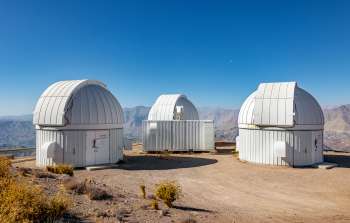sci22089 — Announcement
Opportunity to Participate in Las Cumbres Observatory Key Projects: Deadline 1 November 2022
October 27, 2022
Las Cumbres Observatory (LCO) is seeking letters of intent, due 1 November 2022, for new Key Projects. LCO plans to allocate up to 4000 1-meter hours, 800 2-meter hours, and 2000 0.4-meter hours per semester to Key Projects. New Key Projects can begin 1 August 2023 (semester 2023B) and request time for up to six semesters (through 2026A). LCO plans to issue Key Project calls every 18 months. The MuSCAT4 instrument, a clone of MuSCAT3, will replace the SPECTRAL camera at the Faulkes Telescope South. Proposers should plan for MuSCAT4 to be available starting in semester 2024A. Information about the 2020 Key Projects is here. Information on the current capabilities of the LCO network can be found at the LCO website.
Who Can Apply?
All researchers who have access to LCO are permitted to lead or participate in Key Projects. This includes LCO Science Collaboration members and investigators at US institutions who are eligible to apply for LCO Open Access time through NSF’s NOIRLab. The Open Access time is funded by an NSF Mid-Scale Innovations Program in Astronomical Sciences (MSIP) award through semester 2023B. LCO will apply for a continuation of that award. The time in Key Projects is not paid for through the MSIP award. It is provided by LCO. LCO will select a maximum of two Key Projects with PIs eligible through the MSIP award.
Definition of Key Projects
Key Projects are large projects that will have substantial scientific impact on questions that are widely considered to be of significant astrophysical interest. They require a large number of hours (at least 500) and may require observations over several years. Key Projects often provide observational or derived datasets that are of interest to other researchers, in part because they can gather observations of a particular class of object in a coherent and uniform way. The nominal proprietary period for Key Projects data is one year.
Key Projects are carried out by organized teams with well-thought-out management of effort and resources. They are likely to require resources in addition to the telescope time, perhaps computing for analysis or theoretical studies, or time on larger telescopes to further follow a subset of the sample.
Key Projects require specific and well-defined scientific goals. It is expected that the resources to accomplish those goals are available, or there is a plan for acquiring the needed resources.
Letters of Intent
To ensure that the Key Project Time Allocation Committee has the necessary expertise, LCO requires letters of intent. Letters may be submitted by individuals or groups as an email to keyproject@lco.global by 1 November 2022, with the following information:
- Name and affiliation of PI or Co-PIs
- Name and affiliations of all co-investigators
- Proposal Title
- General subject area: e.g., supernovae, exoplanets, asteroids
- A brief abstract that provides the specific science interests within the general subject area
LCO is not accepting new gravitational wave follow-up Key Project proposals in 2023B. The proposal selected for 2020B-2023A was delayed due to the pandemic. An updated version of that proposal will be supported through LIGO-VIRGO O4.
Note that while LCO contributes a large amount of its own network time to this program, it is expected that others bring significant contributions as well. These contributions may be additional LCO time obtained through another partner, access to other facilities, dedicated personnel, or other kinds of resources.
2023 Key Project Schedule
|
KEY PROJECTS |
|
|
3 October 2022 |
Call for proposals issued |
|
1 November 2022 |
Key Project letters of intent due (email to keyproject@lco.global) |
|
19 January 2023 |
Proposals due • noon PST • 20:00 UTC |
|
14 February 2023 |
Results announced |
|
Semester 2023B begins 1 August 2023 |
|
This schedule is designed to ensure that the results of the Key Project call for proposals are available before the proposals for regular time allocations are due at LCO and NOIRLab for 2023B.
About the Announcement
| Id: |
ID
sci22089
|
